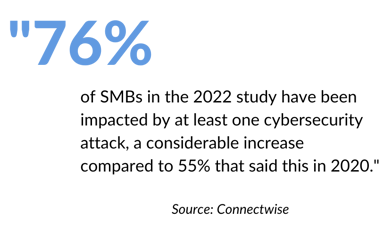76% of SMBs reported experiencing at least one cyberattack in 2022, according to Connectwise. Attacks targeting smaller businesses are rising, often because their cybersecurity is less advanced and cybercriminals may find it easier to conduct a successful attack.
Many businesses store sensitive information about their clients. If a data breach or other type of attack were to occur, it could disrupt business operations and potentially lead to financial loss, identity theft, and reputational damage. It’s essential for SMBs to protect sensitive data, defend against cyber threats, comply with regulations, and maintain business continuity, but many face the following challenges:
Cybersecurity Challenges Facing SMBs
- Lack of awareness: SMBs owners and employees may be unaware of the potential cybersecurity threats they face and how to protect themselves and their business. In this case, many businesses lack basic cybersecurity hygiene, such as implementing strong passwords, updating software and devices, and securing files.
- Third-party risks: SMBs often work with vendors and other third-party companies who may not enforce the same level of security as they do. This can leave organizations vulnerable to potential risks, even if they have strong cybersecurity measures in place.
- Phishing, malware, and ransomware: Small businesses are often targeted by phishing, malware, and ransomware attacks, which can be costly if they don’t have the resources and processes in place to prevent and withstand these threats.
- Mobile device security: As more businesses are increasingly using mobile devices, it can be difficult to ensure sensitive information stored in them remains secure.
- Lack of expertise: Many SMBs may not have dedicated IT or cybersecurity experts, leaving them without the necessary skills to implement effective security measures.
How To Address Your Cybersecurity Challenges
Small to mid-sized businesses should make cybersecurity a company-wide priority and implement measures to ensure their organization remains resilient in the face of threats. By following the best practices outlined below, SMBs can strengthen their cybersecurity posture and minimize risk.
Assess your risks. Conduct a risk assessment to identify critical assets and vulnerabilities and develop a risk management plan. Assessing your risks will help to identify those that are most significant and will allow you to prioritize your cybersecurity efforts.
Conduct vendor due diligence. Before you choose to work with a third-party vendor, be sure to conduct a comprehensive review of their security policies and procedures, as well as any previous security incidents. Doing so will help you identify potential risks associated with the vendor and will allow you to determine whether they’re a trustworthy partner.
Implement strong password policies. Weak passwords are more likely to be compromised and can lead to data breaches, identify theft, and financial loss. Strong passwords can reduce the risk of brute-force attacks and other hacking attempts and will increase your overall security. Use complex passwords including 12 characters or more, such as a longer passphrase stringing 3 to 4 words together.
Monitor your network. Continuously monitor your network activity to detect and respond to any threats in real-time. Keep an eye out for suspicious activity including unexpected network traffic, failed login attempts, and unusual behavior by employees.
Educate employees. Human error is a significant contributor in many cybersecurity incidents. SMBs should provide cybersecurity training for all employees to ensure they’re aware of the risks and know how to protect the organization’s sensitive information.
Read: 5 Ways Your Employees Can Support Your Cybersecurity Culture
Backup your data. Regularly backup critical data to protect against data loss in case of a disaster, system failure, malware attack, or human error. Backups can ensure compliance with regulations, business continuity, and peace of mind knowing your data is secure.
Keep software up to date. Software vulnerabilities can leave your systems open to cyberattacks. Update your software as soon as new versions become available to ensure you have the latest security patches that will defend against threats and fix known vulnerabilities.
Implement access controls. Access control determines who is authorized to access certain resources and information and who has the ability to perform specific actions. Implementing role-based access control and only granting the minimum permissions required to those who need it to perform their jobs can prevent unauthorized activity and mitigate the impact of security incidents.
Install a firewall and antivirus software. A firewall can block unauthorized access to a network, while an antivirus software can detect and remove malicious software before any damage is done. Together, they work to protect your network from security threats.
Develop an incident response plan. Establish a documented set of procedures that detail how your organization will respond to a disruption or cyber incident. Identify key stakeholders and be sure to test your plan on a regular basis.
Following cybersecurity best practices, such as continuously monitoring your network, regularly updating software, training employees on security best practices, and partnering with reputable vendors and contractors, will improve your SMB’s cybersecurity and reduce potential risks. However, some small to mid-sized businesses may not have the resources or expertise to keep up with new methods carried out by cybercriminals and the increasing threat landscape. In this case, consider outsourcing to a trusted Managed Services Provider who can provide expertise, 24/7 support, and scalability.
As an MSP, Lloyd Group understands the challenges SMBs face managing their IT infrastructure and cybersecurity. Our proactive and comprehensive cybersecurity offerings provide businesses with continuously evolving security policies that work to increase their resilience against cyber threats. With 24/7 monitoring and support, we ensure that we’re always available to help with any security concerns or incidents.
Contact us to learn how Lloyd can implement our cybersecurity platform tailored to your business needs to increase your cybersecurity posture and ensure that your business stays ahead of the latest trends.
Read next: Women in IT: 5 Tips for Starting Out in Tech



